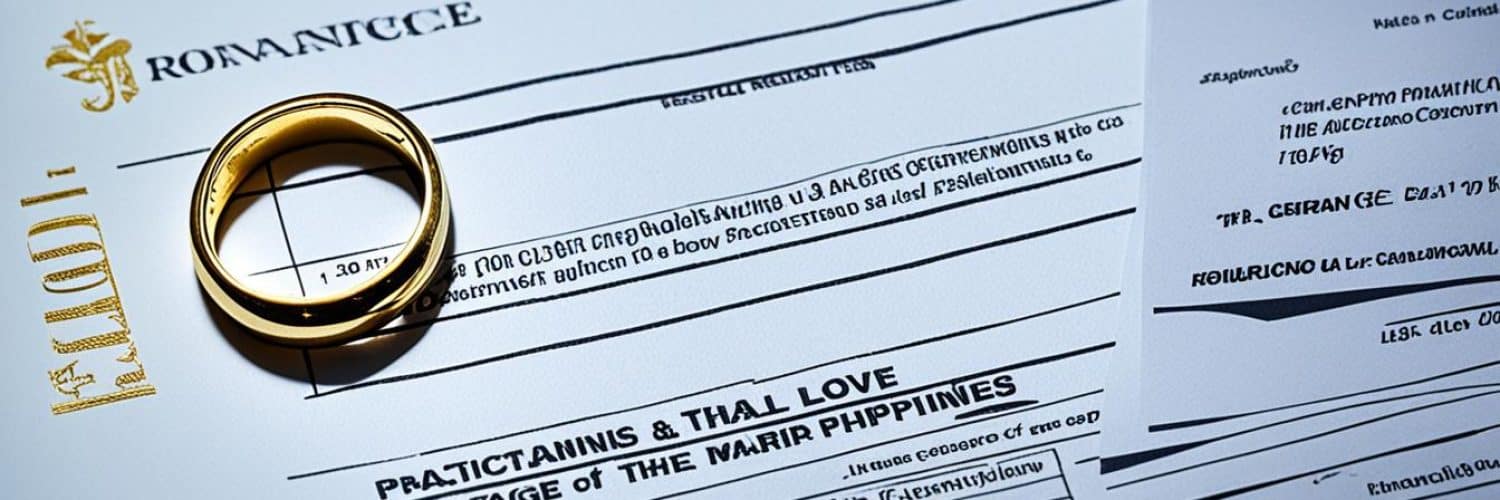Are you thinking about getting married in the Philippines? This country is not just a beautiful place for your wedding but also has its own set of laws for marriage. It’s important to know these laws to make sure your marriage is legal and protects your rights1.
The Philippines has rules about the legal age for marriage and what can lead to annulment. These laws affect everyone, whether you’re a Filipino or marrying one. Don’t worry, this guide will explain everything you need to know to make your marriage legal and smooth2.
Key Takeaways
- The legal age for marriage in the Philippines is at least 18 years old13.
- You need to get a marriage license from the local civil registrar where one of you lives1.
- Before you get married, you must attend a seminar on family planning and responsible parenthood1.
- Reasons for annulment include being mentally unfit, fraud, or being forced or intimidated1.
- Foreigners can marry here if they meet certain legal conditions, like a certificate proving they can get married13.
Marriage Laws in the Philippines: An Overview
The Philippines has strict laws about marriage, blending statutory laws, customs, and religious rules for some groups4. The main laws that cover marriage are the Family Code, Civil Code, and the Code of Muslim Personal Laws5. Marriage is seen as very important, and the laws make sure everyone knows their rights and duties.
Applicable Laws: The Family Code, Civil Code, and Code of Muslim Personal Laws
The Family Code of the Philippines is the main law for marriage and family matters4. It sets the rules for a valid marriage, what spouses can expect from each other, and when a marriage can end5. The Civil Code of the Philippines also talks about marriage, like who can get married and how it should be done4. For Muslims, the Code of Muslim Personal Laws of the Philippines has its own rules for marriage and divorce.
Understanding Marriage as a Legal Institution
In the Philippines, marriage is more than just a personal and social step; it’s also a legal one with clear rights and duties4. The law sees marriage as key to strong families and social peace5. So, the rules and process for marriage are made to protect everyone involved, including any kids.
“Marriage is not a mere contract, but a social institution vital to the public welfare and morals of the people.”
– Philippine Supreme Court
The laws in the Philippines make sure marriage is clear and protected for everyone4. This institution is seen as the base of a stable society. The law helps keep marriage sacred and supports family well-being56.
Legal Capacity and Consent Requirements
In the Philippines, laws set clear rules for getting married. To get married, both people must be able to legally get married. They must be at least 18 years old7 and not have any legal reasons that stop them from marrying7.
Age and Parental Consent/Advice
If you’re under 21, you need your parents’ okay to get married. If you’re 21 to 25, you just need their advice7. You also need a special certificate to prove you can get married, which is good for 4 months8.
Validity of Consent
Consent must be given freely and in front of someone who can marry you. If a marriage is forced, scary, or influenced, it might not be valid7. Getting this special certificate at the embassy costs PHP 1,8408.
If you were married before in the Philippines and got divorced in Denmark, you need to make sure your divorce is recognized here8.
“Consent must be freely given in the presence of a solemnizing officer, as a marriage without consent or obtained through force, intimidation, or undue influence is considered voidable.”
| Requirement | Details |
|---|---|
| Legal Age for Marriage | 18 years old for both males and females7 |
| Parental Consent | Required for individuals below 21 years old7 |
| Parental Advice | Required for individuals between 21 and 25 years old7 |
| Validity of Consent | Consent must be freely given, otherwise the marriage is voidable7 |
Knowing the rules for marriage in the Philippines helps make sure your marriage is valid and recognized789.
Marriage License Application Process
Getting a marriage license is the first step for couples planning to get married in the Philippines10. The couple must get a license from the local civil registrar where one of them lives. This includes a public notice and a wait of11 10 days.
To start, set up an appointment by emailing the civil re**********@*********us.org12. Both partners need to be there to apply and bring the needed documents, like the Certificate of Legal Capacity to Contract Marriage (LCCM).
- The marriage license is advertised for12 10 days before it’s given out.
- This license is good for1012 120 days and expires if not used.
- To get a Marriage Certificate, ask online from the Philippine Statistics Authority (PSA) within12 6 to 12 months at www.psa.gov.ph.
You’ll need to give several documents, like many Marriage License Application Forms12, a PSA Birth Certificate with Apostille, and your Philippine Passport. You’ll also need proof of Filipino citizenship, photos, and pay10 US$25.00 for the license and10 US$60.00 for the ceremony.
Some may need extra papers, like being single, a widow/widower, or having a previous marriage annulled. If you’re 18-25, you’ll need your parents’ okay11. You must be at least 18 to get married in the Philippines.
| Requirement | Details |
|---|---|
| Marriage License Application |
|
| Marriage Certificate |
|
| Fees | |
| Additional Requirements |
By following the right marriage license application process, couples can start their marriage journey smoothly in the Philippines.
“The marriage license application is a key first step for couples in the Philippines. Plan ahead and gather all needed documents for a smooth process.”
Solemnization and Authorized Officiants
In the Philippines, only certain people can make a marriage official. These include judges, priests, ministers, rabbis, imams, or those with government permission13. You can get married in places like churches, temples, courts, or even at consuls’ offices if you’re getting married abroad13. The person who makes you married must make sure it’s done right and that both people can legally get married13.
Public Ceremony Requirements
Getting married in the Philippines means having a public ceremony14. The couple and the person making them married must be there14. This public ceremony is key for the marriage to be legal14. Even if you want a small ceremony, you still need to have a public one to make it official14.
Qualified Solemnizing Officers
Many people can make marriages official in the Philippines13. This includes judges, priests, rabbis, imams, and ministers who get the okay from their group and register with the civil registrar13. In some cases, like when someone is dying, ship captains, airplane bosses, and military leaders can also marry people13. And if you’re getting married outside the Philippines, consuls or vice-consuls can do it13.
Even if the person making you married doesn’t have the right to do so, your marriage might still be okay if you both thought they could13.
“Our wedding day was a truly special moment for us. We wanted to keep the ceremony simple and fuss-free, and the team at Solemnizing Marriage Philippines helped us achieve that. They made the process seamless and ensured that our union was solemnized in accordance with the law.”
– Ron and Leza, newly married couple
Solemnizing Marriage Philippines is a top choice for making marriages official in the country15. They work with suppliers and wedding fans to make the ceremony process easier for couples15.
Philippine Marriage Laws
Marriage laws in the Philippines cover many aspects of this legal bond. They include the rules for a valid marriage and the rights and duties of married people16. These laws aim to protect marriage and the rights of those who get married.
To get married in the Philippines, you need to meet certain legal requirements16. You must have the legal right to marry, give your consent in front of an official, and have the official’s authority16. Before the wedding, couples must also attend a seminar on family planning16. In the Philippines, the tradition of “pamanhikan” means asking the woman’s parents for permission to marry16.
In the Philippines, couples can’t legally end their marriage, making it one of two countries with this rule, the other being the Vatican17. But, they can file for annulment or legal separation18. In 2013, over 10,000 petitions were filed to end marriages, with women filing more than half18. Getting an annulment can be expensive, costing between $2,000 to $10,00018.
Despite the challenges, many people support making divorce legal in the Philippines. A survey found 50% of adults support it, while 31% are against17. The Philippine Congress will end in May 2025, which could affect a divorce bill17.
| Key Statistics on Philippine Marriage Laws |
|---|
|

In summary, the Philippine marriage laws are detailed, covering many aspects of marriage. They include legal requirements, annulment processes, and debates on divorce legalization. It’s important to know these laws if you’re thinking about getting married in the Philippines181716.
Property Relations and Marital Regimes
In the Philippines, property laws for married couples come from the Family Code, Civil Code, and Property Registration Decree19. Couples can pick from three main property rules: Absolute Community of Property (ACP), Conjugal Partnership of Gains (CPG), or Complete Separation of Property20.
Under ACP, all assets owned before and during marriage become shared. Both must agree on any deals or changes19. CPG says only property earned during marriage is shared, while pre-marriage assets stay personal20. Complete Separation lets each person own and manage their own stuff without needing the other’s okay20.
Titles under ACP often list both spouses, showing they own it together19. Under CPG, one person might own the title, but it could still be shared19. Selling or giving away property needs both spouses’ okay, especially under ACP19.
When one spouse dies, property gets divided by law, considering the marriage type and heirs19. Legal separation, annulment, or divorce decide how property is split19.
Couples can make a pre-marriage agreement to set their property rules, following legal rules and protecting creditors19. They can also change their property rules through court, making sure it’s legal19.
Available Property Regimes for Couples
The Philippines has three main property rules for couples:20
- Conjugal Partnership of Gains (CPG)
- Absolute Community of Property (ACP)
- Complete Separation of Properties
For Filipino couples, the rule depends on when they got married. Before August 3, 1988, it’s CPG. After, it’s ACP20.
For international couples, they can choose the law for their property from where one spouse is from, their current home, or a new home after marriage20.
Experts suggest a prenuptial agreement to make property rules simpler20.
“The regime of Conjugal Partnership of Gains is the most common property regime among middle-class married Filipinos, especially those who were married before August 3, 1988.”21
Conjugal Partnership of Gains splits property equally if the marriage ends, unless agreed otherwise21. After August 3, 1988, Absolute Community of Property makes all new and pre-marriage assets shared21. Complete Separation lets each keep their own stuff without needing the other’s say-so211920.
Spousal Rights and Obligations
In the Philippines, being married means you have certain rights and duties towards your spouse. The Family Code22 explains this. Marriage is seen as a “special contract of permanent union” between a man and a woman. You must be at least 18 years old to get married22. You don’t need a special form or religious ceremony, but you must get a marriage license from the local civil registrar22.
The Family Code also talks about what spouses must do for each other23. Both husbands and wives must live together, love, respect, and be faithful to each other. They also need to help and support each other23. If one spouse can’t live with the other for good reasons, the court might let them live apart23.
Both spouses share the responsibility of supporting the family, using money from shared or separate earnings.23 Running the household is a job for both partners23. If one spouse can’t handle their marriage duties because of mental issues, the marriage might not be valid23.
- 80% of what spouses must do includes living together, loving, respecting, and supporting each other as per Article 68 of the Philippine Marriage Laws24.
- No one can sue for damages because of not meeting marriage duties as the laws say24.
- Husbands can be charged with rape of their wives in the Philippines, as stated in Art.266-A of the Revised Penal Code24.
- Long refusal to have sex can show a spouse is mentally unfit in marriage, as a Supreme Court case shows24.
- The court can decide where the family lives if spouses can’t agree as per Article 69 of the Family Code24.
- Spouses can live apart if they have good reasons, with court approval, as the laws explain24.
- Both spouses are responsible for family support and expenses from shared or separate earnings, as Article 70 says24.
- Both partners are in charge of the household and must pay for things as Article 70 states24.
- Not doing duties or harming the family can lead to legal actions like separating legally, ending the marriage, or dividing property, as the text explains24.
The laws in the Philippines aim to protect the family. They make sure spouses meet their duties to each other and their kids24. Knowing these rights and duties helps build a strong, happy marriage that follows the Family Code’s rules24.
Grounds for Nullity and Annulment
In the Philippines, the laws for ending a marriage are clear. They cover void marriages and annulments. These include not having the right legal steps, being mentally unfit, incest, going against public morals, marrying someone else, and marriages that are not valid from the start25.
For annulment, reasons include not having parental okay, being insane, lying, being forced, unable to have sex, or having a serious disease25. If a marriage is declared null, the shared property gets split and settled25. Kids born before the nullity are seen as illegitimate, unless certain conditions apply25. Deciding on child custody is based on what’s best for the child25. Getting a marriage declared null or annulled in the Philippines can take 10 months to a few years25.
Void and Voidable Marriages
Some marriages are seen as void right from the start in the Philippines. This includes being too young, not having parental consent, or being mentally unfit, or being in an incestuous relationship26. Voidable marriages are those that are okay but have some issues. These can be not having parental consent if you’re 18 to 21, being mentally unfit, lying, being forced, unable to have sex, or having a serious disease26.
Being mentally unfit is a common reason for annulment in the Philippines. Other reasons include being too young, not having a marriage license, marrying someone else, or being in an incestuous relationship26. Getting a marriage annulled can be hard because you must prove the mental issue was there before marriage and can’t be fixed26.
In 2024, a bill passed in the Senate to make it easier to end a marriage. It includes reasons like being apart for 5 years, being forced into marriage, violence, cheating, getting a divorce abroad, not getting along, or ending a marriage by a church or tribe26.
Not having parental consent if you’re 18 to 21, being mentally ill, lying, being forced, unable to have sex, or having a serious disease at marriage are all reasons for annulment in the Philippines27. But not being separated for a long time or cheating isn’t enough to annul a marriage27.
| Grounds for Void Marriages | Grounds for Voidable Marriages |
|---|---|
|
|
“The grounds for annulment in the Philippines are clearly defined in the law, providing couples with a legal pathway to address issues in their marriage. Understanding these grounds is crucial for those seeking to dissolve their union.”
Marriages in the Philippines can be declared null or void for different reasons252627. This process is complex but important for couples to know. It helps protect their rights and the well-being of any children.
Legal Separation Under Philippine Law
In the Philippines, legal separation is an option instead of annulment. Legal separation lets married couples live apart without ending their marriage. It changes how they handle property and child care but doesn’t let them get married again. This is unlike divorce, which is not allowed in the Philippines for most people28.
Legal separation is possible if there’s physical violence, addiction, or other serious issues28. Getting a legal separation can take a few months to over a year, depending on the court’s workload and the case’s details29.
Unlike getting an annulment, legal separation doesn’t end the marriage. Both people are still married and can’t get married again2830. The goal is to help couples live apart and settle issues like child care, property, and money support29.
Before approving a legal separation, the court tries to fix the marriage problems28. There’s a 6-month waiting period before starting the legal process28.
To get a legal separation, you must file a petition and serve it to others involved28. The process includes mediation and ends with a court order28. The court usually gives custody of children to the innocent spouse28.
| Comparison Between Legal Separation and Annulment in the Philippines | Legal Separation | Annulment |
|---|---|---|
| Marital Status | Parties remain legally married and cannot remarry | Parties are treated as if they were never married and are free to remarry |
| Grounds | Physical violence, addiction, abandonment, sexual infidelity, bigamous marriage | Lack of parental consent for underage marriages, mental incapacity, fraud, force, sexually transmitted diseases |
| Legal Process | Less stringent, with a focus on living separately and addressing practical issues | More stringent, involving proving specific grounds, presenting evidence, and undergoing court hearings |
| Remarriage | Not permitted without obtaining a divorce abroad | Parties are free to remarry once the annulment is granted |
Legal separation in the Philippines helps couples live apart while still being married. It deals with child care, property, and money issues. But, it’s different from divorce because it doesn’t end the marriage and doesn’t let remarriage without a foreign divorce30.
“Legal separation in the Philippines allows married couples to live separately without ending their marriage bond, requiring obtaining a divorce in a foreign country to be able to remarry.”30
Special Considerations for Muslim Marriages
In the Philippines, Muslim marriages follow the Code of Muslim Personal Laws. This law respects the unique customs of Filipino Muslims31. It sets rules and requirements for these marriages.
Mahr (dowry) shows the groom’s promise to support his wife. It’s a key part of Muslim marriages31. The need for a Wali (male guardian) during a Nikah shows the variety in Islamic views on marriage31. Muslim women can’t marry outside their faith, following old traditions and laws31.
The Nikah ceremony is a big event in Muslim culture. The couple says “Ijab-o-Qubul” and the groom gives Mahr with witnesses watching31. Islam allows polygamy under certain conditions. The husband must treat all wives fairly31.
Today, Muslim marriages face issues like interfaith relationships. Talking openly and getting advice from religious leaders is key31. Divorce can happen through Talaq, Khula, or a court order. These methods focus on solving problems and keeping marriage sacred31.
A 2016 Oxfam survey found 51% of marriages in Lanao del Sur were arranged, with 22% in Maguindanao32. Only 14% of women in Lanao del Sur agreed to their marriages, but 89% of men did32. After fighting in Marawi, more Maranao youth got married early32.
Experts like Anwar Radiamoda and Macrina Morados say getting both people’s consent is crucial in Muslim marriages32. They highlight the need for the minor’s consent too32. The law requires both partners to agree freely32.
Trying to stop child marriages is hard because of PD 1083, which lets the wali arrange marriages for Muslim women32. There’s a push to make child marriage illegal in the 18th Congress, aiming for a minimum age of 1832.
People want to raise the Muslim marrying age to 18, with help from ulama, Muslim leaders32. Islamic teachings stress preparing and educating people before marriage. Building strong families is a main goal32.
This guide helps solve issues at the intersection of Islamic and U.S. laws for American Muslims33. It’s for judges, lawyers, and others who work with American Muslims33. The guide is about understanding both Islamic and U.S. family laws33.
A 2011 factsheet has stats on violence and help-seeking in Muslim communities33. The goal is to protect Muslims’ civil rights and keep marriages safe33.
A workshop on Gendered Islamophobia is for those fighting gender-based violence33. It explores how gendered Islamophobia affects their work and how to fight it33. Topics include community support, the War on Terror’s impact, and fighting Islamophobia in Asian American communities33.

Cross-Border and Interfaith Marriages
If you’re a foreigner wanting to marry in the Philippines, you can do so. But, you must meet certain legal requirements. For interfaith marriages, there are more things to consider34.
Requirements for Foreign Spouses
To marry in the Philippines as a foreigner, you need a certificate of legal capacity to contract marriage. This proves you can legally marry in your home country35.
At the Philippine Embassy, there’s a ten-day wait before your marriage can be solemnized. The cost is SGD 229.5035. You must bring two witnesses over 21, along with documents like birth certificates and passports35.
If you’ve been married before or are a widow/widower, you might need more documents35. Those 18 to 25 need a marriage counseling certificate, as the Family Code requires35.
Interfaith Marriages in the Philippines
For interfaith marriages, one partner must be from the church of the officiant. A court rejected a challenge to a law that says marriage must follow the beliefs of the couple34.
Before, interfaith couples easily registered their marriages at the Civil Court. But, the rules have changed over time34. Some worry that these marriages could confuse the couple and their kids34.
Yet, those in interfaith marriages say they respect each other’s beliefs without forcing them on each other34. The article suggests the government should be more positive about diversity and not interfere with adult marriages34.
Whether you’re a foreigner or in an interfaith marriage, the Philippines welcomes you. With the right legal knowledge and an open mind, you can make a strong, loving marriage34.
Marry a Beautiful Filipina
The Philippines is known for its beauty and friendly people. It’s a top choice for couples wanting to get married. The country has a rich culture and clear marriage laws, making it perfect for couples to start their life together36.
If you’re thinking of marrying a Filipino woman, you’ll find lots of help and support. The Philippines has a big online community for foreigners and Filipinas interested in international relationships and marriage36.
One big plus of marrying a Filipina is their strong family values. They are seen as caring, faithful, and family-focused partners37.
- With a median age of 21.6 years for first marriage, you’ll have a partner ready to start a family and build a future37.
- The Philippines sees people starting families early, around 23 years old37. It’s great for couples wanting to start a family quickly.
- Even though the fertility rate is 1.9 children per woman, it’s dropping. This shows changing cultural views and personal choices37.
Divorce is not allowed in the Philippines, but there are legal ways to end a marriage or separate. This helps couples deal with marriage issues37.
“Getting married in the Philippines can be magical and unforgettable. The country’s culture and beauty make it perfect for couples to start their life together.”
Planning a wedding in the Philippines? You might consider virtual ceremonies or traditional Filipino jewelry, clothes, and rituals38.
| Traditional Filipino Wedding Elements | Significance |
|---|---|
| Barong Tagalog | A formal, traditional Filipino garment worn by the groom and groomsmen |
| Unity Candle | A symbolic ceremony where the couple lights a single candle from two separate candles, representing the union of two lives |
| Coins (Arrhae) | Represents the groom’s commitment to provide for the bride and their future family |
| Cord (Yugal) | Symbolizes the couples’ unity and the intertwining of their lives |
| Veil (Lambong) | Represents the bride’s modesty and the groom’s protection of his wife |
Adding these elements to your wedding makes it special and true to the Philippines’ culture38.
Whether you want a traditional or modern wedding, the Philippines has many options. It’s a great place to marry a beautiful Filipina and start your life together36.
Divorce: The Ongoing Debate
In the Philippines, divorce philippines is not legal for non-Muslim citizens. Yet, the idea of ending a marriage is still a topic of debate39. The family code philippines offers options like annulment and legal separation. But, the lack of a divorce law has led to calls for change39.
The proposed Absolute Divorce bill lists many reasons for divorce, like domestic abuse and drug addiction40. It also includes grounds such as marital infidelity and irreconcilable differences40. The bill requires a 10-year time frame to file for divorce after the issue starts40. It also has a 60-day period for couples to try to work things out before going to court40.
House Bill 9349 helps those with assets under P2.5 million by covering filing fees and offering free legal and psychological help40. The bill also focuses on the well-being of children and the rights of the spouse who was wronged40.
The debate on divorce philippines looks at the emotional and financial effects of ending a marriage40. It also talks about how it might affect families and the need for support for family programs40. The Philippines is one of the few countries without divorce laws39. People have different views on it, with some supporting it and others opposing it39.
There have been many bills to make divorce legal in Congress39. But, getting everyone to agree is hard39. Supporters say it could help with issues like domestic violence39. Opponents believe it’s because of the strong Catholic influence in the Philippines39.
The debate on the divorce philippines is intense and complex41. Supporters think it would be a better way to end a marriage than annulment41. Opponents worry about the big changes it could bring to society and families41.
“The absence of divorce in the Philippines is attributed to the deeply rooted Catholic traditions.”
Prenuptial Agreements in the Philippines
In the Philippines, prenuptial agreements are legal before marriage. They cover how couples will handle their money and property42. These agreements are useful for couples with big age or wealth differences, or if one has kids from before42.
To be valid, these agreements must be written and signed by a notary42. They also need to be recorded in certain official places42. If one part of the agreement is invalid, the whole thing doesn’t fall apart42. Kids aged 18 to 21 who can get married can make these agreements with the right permissions42.
For Filipino couples or those with a Filipino partner, these agreements let them pick which laws apply to their money matters42. This is great for couples from different places or faiths, who might have different laws or customs.
But, not many Filipino couples get prenuptial agreements43. In 20 years, only about 10 clients asked for them, and half went through with it43. This might be because some people don’t trust each other, or because they don’t cover things like child support43.
Even so, prenuptial agreements can be really helpful. They make things clear about money, protect assets, and define who pays what43. They can also protect things like family gifts and set rules for support if a couple splits44.
For business couples, these agreements can say how the business will be run and handled in a split44. It’s important to work with a lawyer who knows about family law and making these agreements in the Philippines44.
In summary, while not many couples in the Philippines get prenuptial agreements, they can be very useful. They offer legal protection, clear money matters, and custom solutions for each couple’s needs.
Conclusion
The laws on marriage in the Philippines are complex and show the country’s deep respect for marriage45. In the Philippines and the Vatican, divorce is banned for most people, except for Muslims4546. But, couples can end their marriage through annulment, legal separation, or nullity47.
It’s important to know the details of Philippine marriage laws if you’re planning to get married here45. With many women not working, the laws protect their rights and duties in marriage45. This ensures their marriage is both a personal promise and a legal agreement that protects them.
The debate on allowing divorce in the Philippines is ongoing47. Supporters say it would give people more freedom and protect them from abuse47. But, the country’s courts support marriage a lot, with the Solicitor General’s Office helping to keep it strong47. Women’s groups offer support to those going through tough times in their marriages47. Knowing the laws helps make your marriage journey secure and happy.
FAQ
What are the applicable laws governing marriage in the Philippines?
What are the legal capacity and consent requirements for a valid marriage in the Philippines?
What is the process for obtaining a marriage license in the Philippines?
Who can solemnize a marriage in the Philippines?
What are the different property regimes available for married couples in the Philippines?
What are the grounds for annulment or legal separation in the Philippines?
How are interfaith and cross-border marriages handled in the Philippines?
Does the Philippines allow divorce for non-Muslim citizens?
Are prenuptial agreements recognized in the Philippines?
Source Links
- https://www.respicio.ph/commentaries/marriage-laws-in-the-philippines
- https://www.brides.com/get-married-in-the-philippines-2303484
- https://www.hg.org/legal-articles/marriage-and-its-validity-in-the-philippines-28688
- https://www.slideshare.net/slideshow/marriage-laws-in-the-philippines/151353788
- https://nomadicfire.com/getting-married-in-the-philippines
- https://www.demographic-research.org/volumes/vol36/50/36-50.pdf
- https://www.respicio.ph/commentaries/marriage-laws-in-the-philippines-a-comprehensive-overview
- https://filippinerne.um.dk/en/travel-and-residence/consular-services/marriage-in-the-philippines
- https://tokyo.philembassy.net/consular-section/services/civil-registration/legal-capacity-to-contract-marriage-certification/
- https://newyorkpcg.org/pcgny/civil-registration/getting-married-at-the-consulate/
- https://www.eventplannerphilippines.com/marriage-registration-philippines/
- https://philippineembassy-dc.org/wp-content/uploads/2022/07/SOLEMNIZATION-OF-MARRIAGE.pdf
- https://pnl-law.com/blog/solemnizing-officers-allowed-to-officiate-marriages-under-philippine-laws/
- https://carpolaw.com/weddings-101/
- https://www.solemnizingmarriageph.com/
- https://en.wikipedia.org/wiki/Marriage_and_wedding_customs_in_the_Philippines
- https://www.aljazeera.com/news/2024/7/5/we-are-not-criminals-philippines-considers-making-divorce-legal
- https://www.theatlantic.com/international/archive/2015/06/divorce-philippines-annulment/396449/
- https://www.respicio.ph/commentaries/understanding-property-ownership-and-marital-status-in-philippine-law
- https://www.divinalaw.com/dose-of-law/mine-marital-property-regimes-domestic-international-marriages/
- https://steemit.com/philippines/@paulthebeloved/philippines-property-regimes-meaning-and-concepts
- https://chanrobles.com/executiveorderno209.htm
- https://www.alburolaw.com/rights-and-obligations-between-husband-and-wife/
- https://atmysites.wordpress.com/category/the-family-code-of-the-philippines/title-iii-rights-and-obligations-between-husband-and-wife/
- https://saklawph.com/annulment/
- https://deborjalaw.com/grounds-for-annulment-in-the-philippines/
- https://montanoflamianolaw.com/grounds-annulment-philippines/
- https://saklawph.com/legal-separation/
- https://www.respicio.ph/features/legal-separation-in-the-philippines
- https://attorney.org.ph/legal-news/456-legal-separation-vs-annulment-in-the-philippines-what-s-the-difference
- https://www.courtly.com/resources/muslim-marriage-rules
- https://www.oxfam.ca/story/too-young-to-marry/
- https://www.api-gbv.org/resources/islamic-marriage-contracts/
- https://www.rappler.com/world/indonesia/103064-growing-up-interfaith-family-indonesia/
- https://www.philippine-embassy.org.sg/marriage/solemnization/
- https://www.expatforum.com/threads/married-in-the-philippines-divorced-in-the-us.1541169/
- https://medium.com/inspirationalwomenseries/things-to-know-before-marrying-filipino-woman-7fe25e69d5e8
- https://www.courtly.com/resources/filipino-wedding-traditions
- https://www.respicio.ph/commentaries/exploring-the-legalization-of-divorce-in-the-philippines
- https://www.gmanetwork.com/news/topstories/specialreports/908578/divorce-in-ph-humanitarian-imperative/story/
- https://www.linkedin.com/pulse/everything-you-need-know-divorce-bill-rziec
- https://www.iafl.com/media/1162/prenuptial_agreements_in_the_philippines.pdf
- https://business.inquirer.net/398749/for-better-or-for-worse-pre-nuptial-agreements
- https://attorney.org.ph/legal-news/391-the-importance-of-pre-nuptial-agreements-in-the-philippines-a-guide-for-couples
- https://igg-geo.org/?p=13576&lang=en
- https://en.wikipedia.org/wiki/Divorce_in_the_Philippines
- https://kontinentalist.com/stories/divorce-and-women-rights-in-the-philippines







Add comment